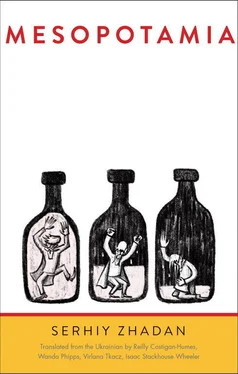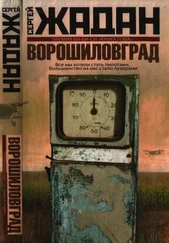She looked up at the hospital windows with a helpless expression. It was a late summer evening. Only two of them were emitting light. One of them went out unexpectedly. She finally gave in and decided to head home.
As far as I could gather, this was her aunt’s place. My best guess was that she lived here too, on Theater Street, in a cluttered three-room apartment packed with books. Fourth floor. She hesitated for a moment in front of her building and then invited me in. Down below, between the trees, tangerine streetlights shone into view. The air smelled like rain, although there hadn’t been any.
She drank tea all night and told some horror stories, primarily about the post office and then about her aunt—about how she had lost her husband at an early age. He was a jockey who was thrown from his horse during a race and died. This was a huge blow for her aunt; she just couldn’t bounce back. She continued going to the track her whole life, taking her niece along. They’d ride over together, when trolleys still ran as far as the park, and sit there, never saying anything—her niece lacked the resolve to ask her any questions; they’d get off and walk over to the stands. She’d remain silent, looking at the distant, restless bodies of the jockeys, choosing who to root for as her niece read the programs with mounting anxiety, and then they walked home, upset and emotionally depleted. She never wound up getting remarried, although, as it turned out, she had many men in her life. Her niece, as it turned out, always suspected something was going on, while she, as it turned out, wasn’t intent on hiding her relationships. The niece remembered the babyish faces of cadets, the shoes of trade schoolers, well worn, as if by the feet of active children, the adolescently slouching bodies of students and interns, and the chins of high schoolers and resentful deserters, nicked by cheap razors, like those of real adults. She didn’t know a single thing about them; they’d occasionally surface in dark hallways, bump into her on their way out of the bathroom, shriek in the shower when she walked in on them, and smile at her as they stepped into the warm, smoky kitchen from the cold balcony. Her aunt never talked about them, and she never asked for any explanations. Whenever she would spend the night, her aunt would call somebody and make some arrangements or step into the hallway by the front door and speak at length with someone, in a firm and convincing tone, and then eventually return to her niece and read her an adventure book as a bedtime story.
Her stories and reminiscences, digressions and clarifications, lasted until the morning; every happy ending ushered in the next story, and every adroit plot twist warranted a continuation. All my attempts at cutting her off came up short, and all my efforts to say goodbye and make my escape were doomed to failure—she held me firmly and confidently, divulging numerous intimate details of her past, as if I were a close relative dying of cancer, like she was thinking, “He already knows everything about everyone anyway and he won’t have time to tell anybody anything.” But whenever I tried to touch her hand—gently, not trying to impose anything on her—she’d reach for her warm mug of tea, and as soon as I’d reach out to fix a strand of hair falling down into her eyes, she’d scoot back slightly and peer out the window, listening to the sirens wailing in the night, down by the river. She asked me to go with her in the morning. How could I say no?
I tried catching up on some sleep in the hospital waiting room. It smelled like iodine. It seemed like I was by the sea in April. She spent a few hours with her aunt and then left to run around from pharmacy to pharmacy looking for the right meds. I agreed to wait for her. In the early evening, the doctors told us that her aunt had lost consciousness.
“Who’d a thunk it?” one of them said, genuinely surprised. “It looked like everything was going smoothly. I hope everything will turn out all right, but be prepared for the worst.” He took me aside and asked me to drive her home. I did.
She sat out on the balcony all night. I brought her tea. I brought her sleeping pills. I brought her wine. I brought her cigarettes. She thanked me, her fingers keeping a death grip on the balcony railing. I wanted to pry them apart and put her to bed, but let’s see you try to pry apart the fingers of a woman who’s on the verge of losing everything. I brought her a blanket, wrapped it around her shoulders, sat down next to her, and counted the meteors until morning. All two of them.
The next morning at eight, the doctor called. He calmed her down, said that her aunt’s condition had stabilized, and asked us to buy some more medicine. I suggested she stay home, promising to handle everything. She rejected my offer, of course. The third straight day on my feet was tough but the longer this went on, the less chance I had of backing out. We spent half the day scouring every kiosk and pharmaceutical warehouse in town; she spent the other half standing outside her aunt’s ward. We got home sometime around midnight. Once again, she had deep, tender circles under her eyes from all the crying and sleep deprivation. I had started hallucinating.
“Go get some sleep,” I told her.
“Nah… but why don’t you? I just can’t sleep after everything that’s happened.”
“Well, I’m gonna sit with you, then.” The last thing I wanted to do was leave her alone out here on the balcony. “How’ve you been? How’s night school going?”
“Good,” she answered quietly.
“What kind of degree are you getting?”
“Tax assessment,” she answered automatically.
“You’ll be good at tax assessing,” I assured her. “What exactly do tax assessors do?”
“They assess taxes,” she answered, reaching for my hand.
Then that feeling of lost time arises again, expanding inside you like a reef, clogging your throat, tormenting and draining you. “I met her ten years ago,” I thought, as she let out her final cry, fell silent, and looked at me, there in the dark, seemingly probing me for answers. Would I tell anybody about her natural hair color, about her split ends? Would I start bragging to my friends about seeing her fragile and exposed? Would I constantly remind her about all her screaming and moaning, all her brusqueness and tenderness, all the soft curves and hard lines under her skin? Ten years ago, she was twenty years old; she didn’t know a thing, but she learned quickly, reviewed all her homework assignments with painstaking care. Where had I been all this time? What was so important that I just had to do? Why didn’t I find out about her habits and behavior back then—ten years ago? Why is it only now that I notice how she tucks her hair back and turns toward the window and how her nails dig into her palms when she wants to restrain herself from giving too much away? Why is it only now that I figure out she loves talking in the dark, speaking and reacting to voices and warm movements in the twilight? Why did it take me so long to muster up the strength to catch her, compel her to stay, compel her to do what she loves? Ten years—that’s enough time to forget everything and fabricate another storyline, to break the sky down into its constituent parts and try to reassemble it, never doubting, not even for a split second, that your brash undertaking will succeed. What happened to all the time that had passed by? What had it been used for? What effect did it have on us? I closely examined the fine wrinkles under her eyes. People who smile a lot—who smile a lot and for a long time—are bound to develop wrinkles like that. Her face had acquired a certain sharpness and maturity; she had basically stopped using makeup, although she still always managed to look put-together. It may have been her expressive eyes, it may have been the dullness of her skin that wasn’t getting any younger. Yet her collarbone was just as sharp, her nails, always engaged in active combat, were just as chipped; her knees were scratched, and her calves were bruised. She looked like a trapeze artist who’d been flying through the air for the last ten years, colliding with clumps and fragments of electrified emptiness as she reached out to grab them. When she had worn herself out, she asked for some water. Her voice was parched, her whispers hoarse and barely audible, as though she didn’t want to wake anyone who was sleeping at such a late hour. She’d wet her lips, catch her breath, clearly delighted, and start searching for me in the damp, tangled sheets once again. At four a.m., all talked out and all calmed down, she started falling asleep. Her voice came through her dreams; she was recalling some names, gesturing toward some thin scars on her neck, taking out a cigarette, asking for a light, and falling asleep with it still hanging, unlit, in her hand. I carefully removed it from her fingers and placed it off to the side, on the chair, with her girlish bra dangling from the back and my unused condoms lying on the seat. I thought for a second, then put the lighter down, too. “She’ll figure everything out in the morning,” I thought. My third sleepless night in a row was making objects translucent, and the twilight came alive. My heart was hustling along like it was afraid of missing its train. It was bursting forward like a dog that had been chained to a pole for too long. Salty waves were gliding through my body, from my left lung to my right, colliding with the lining of my ribcage and rolling back, their efforts thwarted. Occasional sparks flashed in the dark and the occasional bug blazed by. I had to go catch up on some sleep. I gathered my things, struggled to dress in the hallway, found my shoes, and stepped out of her apartment. The stairwell was bright and ringing with sound, like a mine that had been stripped of all its coal and filled with glass and sundust. A dry August morning was breaking outside. I headed down the stairs, counting the steps, losing track and then resuming my tally. I heard movement down below, behind the trees. “Dogs,” I thought. “Those are some stray dogs waiting to rip my throat out and avenge all those whom I have hurt in my life.” I stopped, steeled myself, and kicked the door. It squeaked and swung wide open. A streak of light nailed me right between the eyes. It was like I’d finally escaped from the labyrinth I’d been wandering in for the last ten years.
Читать дальше










